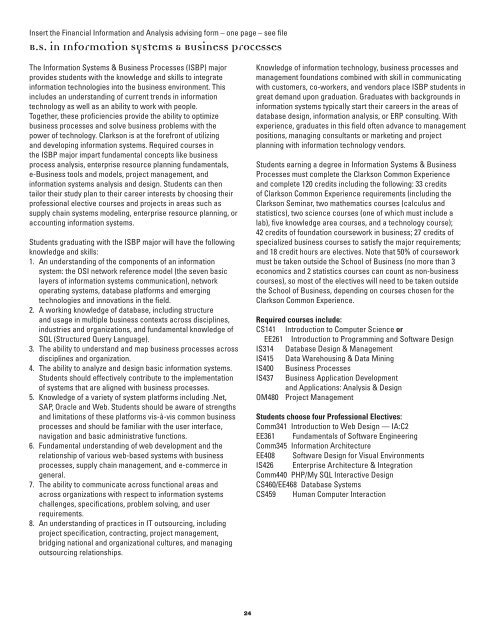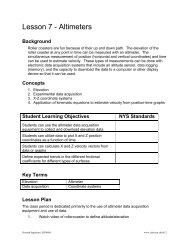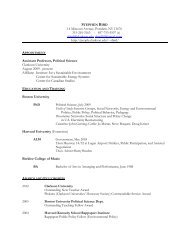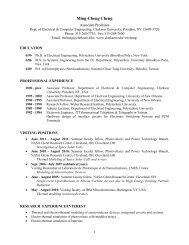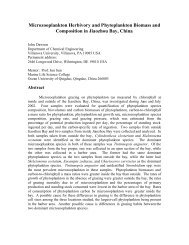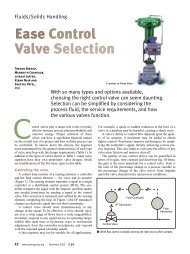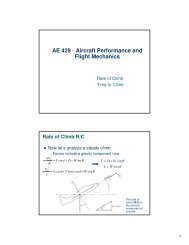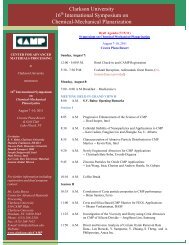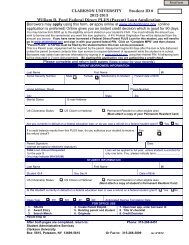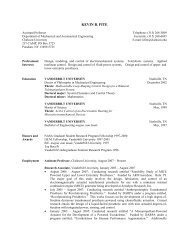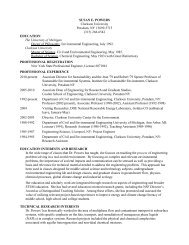School of Business - Clarkson University
School of Business - Clarkson University
School of Business - Clarkson University
You also want an ePaper? Increase the reach of your titles
YUMPU automatically turns print PDFs into web optimized ePapers that Google loves.
Insert the Financial Information and Analysis advising form – one page – see file<br />
B.S. in Information Systems & <strong>Business</strong> Processes<br />
The Information Systems & <strong>Business</strong> Processes (ISBP) major<br />
provides students with the knowledge and skills to integrate<br />
information technologies into the business environment. This<br />
includes an understanding <strong>of</strong> current trends in information<br />
technology as well as an ability to work with people.<br />
Together, these pr<strong>of</strong>iciencies provide the ability to optimize<br />
business processes and solve business problems with the<br />
power <strong>of</strong> technology. <strong>Clarkson</strong> is at the forefront <strong>of</strong> utilizing<br />
and developing information systems. Required courses in<br />
the ISBP major impart fundamental concepts like business<br />
process analysis, enterprise resource planning fundamentals,<br />
e-<strong>Business</strong> tools and models, project management, and<br />
information systems analysis and design. Students can then<br />
tailor their study plan to their career interests by choosing their<br />
pr<strong>of</strong>essional elective courses and projects in areas such as<br />
supply chain systems modeling, enterprise resource planning, or<br />
accounting information systems.<br />
Students graduating with the ISBP major will have the following<br />
knowledge and skills:<br />
1. An understanding <strong>of</strong> the components <strong>of</strong> an information<br />
system: the OSI network reference model (the seven basic<br />
layers <strong>of</strong> information systems communication), network<br />
operating systems, database platforms and emerging<br />
technologies and innovations in the field.<br />
2. A working knowledge <strong>of</strong> database, including structure<br />
and usage in multiple business contexts across disciplines,<br />
industries and organizations, and fundamental knowledge <strong>of</strong><br />
SQL (Structured Query Language).<br />
3. The ability to understand and map business processes across<br />
disciplines and organization.<br />
4. The ability to analyze and design basic information systems.<br />
Students should effectively contribute to the implementation<br />
<strong>of</strong> systems that are aligned with business processes.<br />
5. Knowledge <strong>of</strong> a variety <strong>of</strong> system platforms including .Net,<br />
SAP, Oracle and Web. Students should be aware <strong>of</strong> strengths<br />
and limitations <strong>of</strong> these platforms vis-à-vis common business<br />
processes and should be familiar with the user interface,<br />
navigation and basic administrative functions.<br />
6. Fundamental understanding <strong>of</strong> web development and the<br />
relationship <strong>of</strong> various web-based systems with business<br />
processes, supply chain management, and e-commerce in<br />
general.<br />
7. The ability to communicate across functional areas and<br />
across organizations with respect to information systems<br />
challenges, specifications, problem solving, and user<br />
requirements.<br />
8. An understanding <strong>of</strong> practices in IT outsourcing, including<br />
project specification, contracting, project management,<br />
bridging national and organizational cultures, and managing<br />
outsourcing relationships.<br />
24<br />
Knowledge <strong>of</strong> information technology, business processes and<br />
management foundations combined with skill in communicating<br />
with customers, co-workers, and vendors place ISBP students in<br />
great demand upon graduation. Graduates with backgrounds in<br />
information systems typically start their careers in the areas <strong>of</strong><br />
database design, information analysis, or ERP consulting. With<br />
experience, graduates in this field <strong>of</strong>ten advance to management<br />
positions, managing consultants or marketing and project<br />
planning with information technology vendors.<br />
Students earning a degree in Information Systems & <strong>Business</strong><br />
Processes must complete the <strong>Clarkson</strong> Common Experience<br />
and complete 120 credits including the following: 33 credits<br />
<strong>of</strong> <strong>Clarkson</strong> Common Experience requirements (including the<br />
<strong>Clarkson</strong> Seminar, two mathematics courses (calculus and<br />
statistics), two science courses (one <strong>of</strong> which must include a<br />
lab), five knowledge area courses, and a technology course);<br />
42 credits <strong>of</strong> foundation coursework in business; 27 credits <strong>of</strong><br />
specialized business courses to satisfy the major requirements;<br />
and 18 credit hours are electives. Note that 50% <strong>of</strong> coursework<br />
must be taken outside the <strong>School</strong> <strong>of</strong> <strong>Business</strong> (no more than 3<br />
economics and 2 statistics courses can count as non-business<br />
courses), so most <strong>of</strong> the electives will need to be taken outside<br />
the <strong>School</strong> <strong>of</strong> <strong>Business</strong>, depending on courses chosen for the<br />
<strong>Clarkson</strong> Common Experience.<br />
Required courses include:<br />
CS141 Introduction to Computer Science or<br />
EE261 Introduction to Programming and S<strong>of</strong>tware Design<br />
IS314 Database Design & Management<br />
IS415 Data Warehousing & Data Mining<br />
IS400 <strong>Business</strong> Processes<br />
IS437 <strong>Business</strong> Application Development<br />
and Applications: Analysis & Design<br />
OM480 Project Management<br />
Students choose four Pr<strong>of</strong>essional Electives:<br />
Comm341 Introduction to Web Design — IA:C2<br />
EE361 Fundamentals <strong>of</strong> S<strong>of</strong>tware Engineering<br />
Comm345 Information Architecture<br />
EE408 S<strong>of</strong>tware Design for Visual Environments<br />
IS426 Enterprise Architecture & Integration<br />
Comm440 PHP/My SQL Interactive Design<br />
CS460/EE468 Database Systems<br />
CS459 Human Computer Interaction


